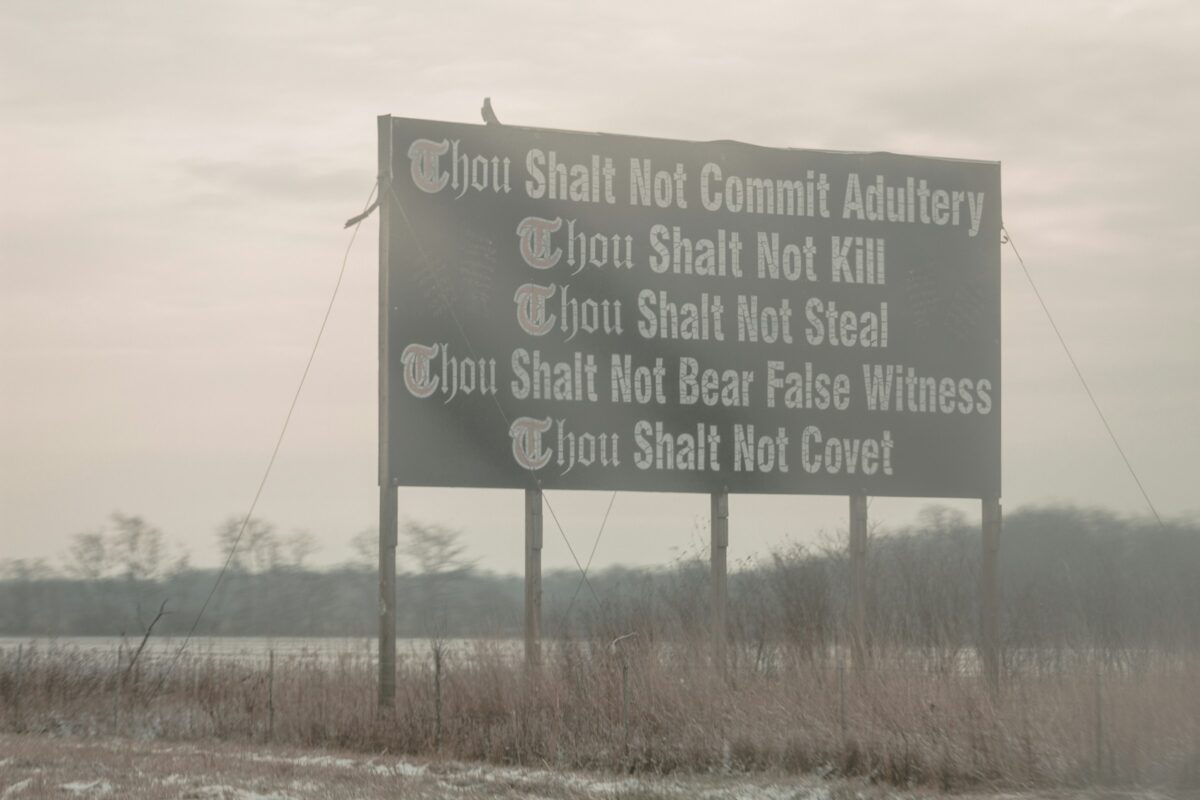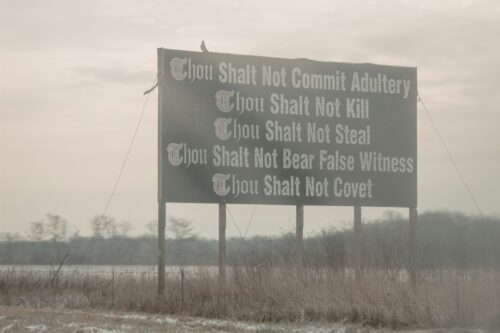
The act of posting the Ten Commandments in public schools not only weakens the church but also poses a threat to the state — a concern that should be shared by all.

Greg Mamula
Louisiana made history by becoming the first state to mandate the display of the Ten Commandments in every public school classroom, from kindergarten to state-funded universities. These poster-sized displays, accompanied by a four-paragraph “context statement,” are a sign of how the misguided Christian Nationalist attempt to merge elements of church and state ends up violating both. This requirement, to be implemented by 2025, is not funded by the state but through donations.
Regardless of where the funding derives, the requirement of posting the Ten Commandments in public school classrooms creates a series of deep concerns for me as a Baptist minister and a member of civil society. The potential for the Ten Commandments to be misused, particularly in the absence of a comprehensive understanding of their context and meaning, is a significant worry.
Biblical Concerns
The Bible is a rich narrative of God’s relationship with creation, particularly with His chosen people, Israel. This relationship is marked by a covenant of blessing, rescue, and redemption for those under the covenant. The New Testament extends these promises into the life, work, teaching, death, and resurrection of Jesus. His resurrection heralded a new creation, infused with the Holy Spirit, and a new covenant inviting all to receive redemption and partake in the Kingdom of God. This Kingdom is the driving force behind the Church, compelling its members to live in the hope of Jesus’s resurrection and His proclamation as the one true King until the full establishment of the New Heavens and New Earth.
The Ten Commandments, or the Ten Statements, are part of that larger narrative. To fully grasp their significance, it’s crucial to understand them within the context of the larger biblical narrative. Riping a handful of verses out of the larger narrative is to quickly remove their context, meaning, and power, especially for those unfamiliar with the larger story. Giving the Ten Commandments to Israel is part of their rescue and redemption process. Exodus 20 is the first appearance of this collection of sayings. Most public posters or sculptures of the Ten Commandments I have observed begin in Exodus 20:3 with the command, “You must not have any other god but me.”
Who are these commands for, and what God does this refer to?
That is why we must have Exodus 20:1-2, “Then God gave the people all these instructions: ‘I am the Lord your God, who rescued you from the land of Egypt, the place of your slavery.’” The Ten Commandments are for the people of Israel who had been set free from slavery by the mighty works of God, who is actively fulfilling promises God made to their ancestors Abraham, Isaac, Jacob, and Joseph. Missing verses 1-2 fundamentally causes us to misunderstand the purpose of the Ten Commandments. If taken out of context, we can incorrectly view them as basic rules for all people. But these commands are given to the people of Israel to live a life with God and their neighbors in a way that helps them be a light to the nations as they continue their journey toward the promised land. These commands are still important and serve as a foundation for the work and life of Jesus and the church, but they must be placed in the larger narrative, or we will quickly lose sight of their ultimate power and purpose. Public postings without such context do not provide the much-needed context necessary to correctly understand, interpret, and apply them to our lives of faith and our engagement with the civic contexts in which we find ourselves.
Theological Concerns
The Ten Commandments were provided specifically for the people of Israel after they were rescued from slavery in Egypt. However, they were not provided as laws in the way we understand modern Western nation-state-style legislation. In the world of the Ancient Near East and Israel, codes and laws were designed to be descriptive and provide a wisdom-based foundation for making decisions on other matters. They were core examples that were meant to be illustrative rather than fully exhaustive examples of how to handle situations that required discernment on how to handle times when people interacted in ways that required a judgment about how to live in a community with one another.
In this way, the Ten Commandments and the subsequent laws of the Torah were not universal laws or codes of conduct for everyone. They were a wisdom foundation for the people of Israel specifically. Equally important, the Ten Commandments and larger Torah commands were given to the people of Israel to create freedom for others, as God had created freedom for Israel. The people of Israel were the only people required to live under the Ten Commandments. The outside nations were not expected or required to obey them. When God judges the outside nations through the prophets, it is generally for what we might call crimes against humanity, such as murder, vice, oppression, violence, abuse, etc. Never for worshiping other gods or disobeying the covenant of Israel. That is reserved for the people of Israel alone, who are held to account for their obedience or lack thereof to the covenant. Also, while some judgments are focused on individuals, most of the judgments upon Israel were communal. All were held accountable as a community for how faithfully they lived their lives with God and others. Modern legislative laws rarely hold entire communities accountable for anything.
They also created an umbrella of protection for anyone living within the confines of the community. It meant that the poor, alien, widowed, slave, landless, and other persons living inside the borders of Israel were to receive the benefits of Israel’s obedience. It meant others should not be at risk of having their property coveted and stolen, their spouses taken, murdered, or placed at risk of being falsely accused of crimes. These were revolutionary commandments because they were uncommon in the Ancient Near East, and the most vulnerable people were always at risk of those in power. God is claiming the power in this covenant relationship, not Israel. Because Israel were once vulnerable slaves at the whims of power, they were to treat others well in their newfound freedom.
Civic Concerns
Baptists have a long tradition of seeking to live within the concept of the separation of church and state. In the United States, we can trace our lineage specifically to Roger Williams, who was exiled from the Massachusetts Bay Colony for his subversive behavior. Eventually, he entered Rhode Island and established the First Baptist Church in America. After a circuitous route of theological and civic wrestling, he eventually crafted the first state charter that sought to separate the church’s rights and responsibilities from the state’s work and purpose. The goal was to protect the theological and ecclesiological work of the church from undue influence from the government.
Different colonies experimented with variations of church and state separation until the crafting of the Constitution of the United States eventually drafted into infamy the First Amendment: “Congress shall make no law respecting an establishment of religion, or prohibiting the free exercise thereof; or abridging the freedom of speech, or of the press; or the right of the people peaceably to assemble, and to petition the Government for a redress of grievances.”

Photo by Sean Foster on Unsplash
The Ten Commandments are part of the Bible, a religious document held sacred, particularly by Jews and Christians. They are accountable only to their conscience and chosen religious body for adhering to the teachings contained within the scriptures. They alone are tasked with the awesome responsibility of interpreting and applying such scriptures to modern contexts.
The state has no such responsibility or requirement. Like the biblical example of the outside nations beyond Israel, so too in our modern world, the government has no expectation of interpretation or application. To pluck these words from their narrative and place them into public settings is a misuse of scripture and civic power. Anytime a state or government seeks to coopt religious documents for its use, it is never for the betterment of the region but exclusively for the advancement of those in power using such writings for its own purposes.
Additionally, as written and posted publicly, seven of the Ten Commandments violate the U.S. Constitution. Thus, they are unenforceable by the government in the public sector or the classroom. There is no way for the state to enforce:
- Having no gods other than the God of Israel or the Christian Church
- The creation or worship of idols
- Misuse the Lord’s name in vain
- Keeping a sabbath
- Honoring a parent
- Coveting
- Having an affair
The First Amendment forbids the government from taking action on the first three commandments because they fall under the establishment of religion or the prohibition from practicing religion. The primacy of obedience to God is only for those who adhere to the teachings of the Bible. Additionally, the government actively creates idol-like symbols and intentionally engages in the hagiography of its most important historical figures. Our culture, by practice and expectation, is one of the world’s most active and productive societies. If the government began mandating sabbath rest, it would certainly alter our ability to engage in our covetous 24-7 free market practices, which we value more than personal piety. Defining what honoring a parent is a cultural value that the state cannot establish or determine in a pluralistic society. If having an affair were a legislative crime, a huge portion of our citizenry and many public figures would be classified as criminals.
Social Implications
The required posting of the Ten Commandments in Louisiana public school rooms ultimately weakens the state and church. It weakens the state because it posts rules and laws it cannot and has no intention of enforcing. It becomes a sign of impotence, if not complete incompetence. Why should anyone take the government seriously if the documents placed in every school serve as moral or legal guides and hold nobody accountable for violating most of them? It does nothing to increase the goodness of the Gospel or the quality of a well-governed state.
Posting the Ten Commandments in public spaces does the exact opposite of their intended purpose, namely, creating freedom for others. The community of Israel was held accountable for obedience and faithfulness to these commands. Their obedience made for a safer society for those under their protection, namely the most vulnerable poor, slaves, widows, sick, and downcast, by holding to account those with power. The public posting of the Ten Commandments does nothing to provide the protection and safety of such persons in our society. Particularly when such laws are passed by a powerful legislative body actively working to create less safety for such persons within its state borders. Our responsibility as citizens is to hold them accountable for such behaviors through our civic engagements, including but not limited to the ballot box.
Posting the Ten Commandments also fails to offer any evangelistic or redemptive purpose. Reciting or memorizing the Ten Commandments does not draw people closer to the redeeming work of Jesus’s resurrection when absent from the larger narrative of God’s engagement with the world. If anything, compulsory posting of such commandments will further conflate state power and religious instruction, potentially pushing people further away from meaningful interaction with both.
Codifying the display of the Ten Commandments in public schools is a show of perceived supremacy that is completely at odds with the welcoming love in the power ethics of Jesus Christ. Instead of the followers of God writing the scriptures on their hearts, the state is inserting itself as a poor substitute by writing on the walls. Lording power, in this way, puts the power of God in the domain of the state. Instead of God being out in the world he created, the state says if you want God, you have to get in the box. This is the very definition of using God’s name in vain by seeking to use his words to further the dominance of those in power.
This only makes the work of the church more difficult because it closes the hearts and minds of those who might respond to God’s open invitation. The state should not be in the business of such invitations because they will always serve as a filter that reduces the power of the Gospel and distracts the state from its responsibility of dealing with civic matters.
I seek to live within the boundaries of the Ten Commandments in my personal life and my covenant relationship with my Baptist community. If I fail to adhere to these teachings, I am accountable to God and my fellow followers of Jesus, who will correct and guide me back into right relationship with God and others. I seek to live within the entire canon of scripture not just a handful of plucked verses used to manipulate others or provide virtue signals to a voting base.
Being fortunate enough to live in the United States of America, I am also a member of a pluralistic society that invites me to engage in the civic process actively. I can petition legislative leaders, vote for candidates, and advocate for bills that can help us live together in harmony and protect the most vulnerable in our society.
My Christian faith certainly informs my opinions about engaging in civil relationships. But as a Baptist, I am uncomfortable when those things overlap in unhealthy ways. The forced posting of the Ten Commandments out of proper context in the classroom serves neither the church nor the state and weakens both.
Rev. Dr. Greg Mamula is the Associate Executive Minister for the American Baptist Churches of Nebraska and a contributing writer for Word&Way. He is the author of Table Life: An Invitation to Everyday Discipleship, published by Judson Press in print and e-reader versions from online distributors including Amazon. To learn more information visit www.table-life.org.






